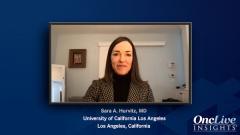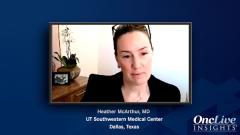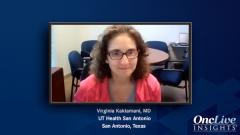
Optimizing Real-World Management of HER2-Low Breast Cancer
Comprehensive insight on evolving management strategies for patients diagnosed with HER2-low breast cancer.
Transcript:
Aditya Bardia, MD, MPH: Clinically at this time, we have this subgroup and we have an agent. The question is how to use the drug, trastuzumab deruxtecan [T-DXd]. Sarah, say we have a patient with metastatic ER-positive breast cancer who has received multiple lines of endocrine based therapy and now you're ready to start chemotherapy. Would you consider trastuzumab deruxtecan as a first-line or second-line agent for hormone receptor–positive, HER2-low breast cancer? And for HER2-low testing, can we use any specimen? Or it should be the last biopsy that was collected?
Sara A. Hurvitz, MD: These are great questions. At this point, DESTINY-Breast04 enrolled subjects who had had 1 prior line of chemotherapy. Sticking strictly with the way DESTINY-Breast04 was conducted, I generally will utilize capecitabine first, which is a nice segue from endocrine-based therapy to chemotherapy. Its oral, and patients tolerate it quite well. And then as the next line of therapy, we'll move to T-DXd if a patient has HER2-low disease. There are exceptions I might consider, given the real marked activity of T-DXd. If I had a patient whose disease was highly symptomatic and blowing up, I might consider trying to get them T-DXd prior to chemotherapy, but that is not how the study was conducted. And there are studies to look at it a little earlier in that setting.
In terms of which sample to use, this remains very controversial, as does testing in general using immunohistochemistry [IHC]. A lot of work is ongoing to define the threshold of expression required for benefit from T-DXd with ultrasensitive testing. We have data from studies showing that patients whose tumors are 1+ seem to benefit just as much from T-DXd as those who are 2+. We have the DAISY trial that indicates about a third of patients have benefit from T-DXd with IHC 0. I have patients who have been IHC 0 and then repeat testing shows 1+.
In fact, if you look at data sets, the concordance from pathologists agreeing on 0+, 1+ is on the order of 26%, which is very, very low. There was an analysis presented at San Antonio [Breast Cancer Symposium] looking at DESTINY-Breast04 samples that were submitted. It interestingly showed about a 77% agreement between historical and central testing in deciding that tumor was HER2 low, which is higher than I expected, but that's reasonable. I'd like to see better. All of us want to make sure, just like with trastuzumab for HER2-amplified disease, you want to make sure you're not missing any patient who might benefit from this therapy. In that setting, there was consistent benefit of T-DXd compared with the control arm across patient subgroups and with different sample characteristics, meaning samples that were submitted from metastases vs archival samples. In my own practice, if a patient has HER2 low in their record by IHC at any time point, they're eligible and I will try T-DXd.
Aditya Bardia, MD, MPH: That makes sense. And you have data to support this decision. On that point, say you have a patient who doesn’t have any HER2 low positivity in the past. Heather, say there's a patient who had testing on the primary breast cancer and first metastatic specimen, and it was HER2 IHC 0. Would you consider a repeat biopsy to look at HER2 status or look at other specimen to find the HER2 low status so the patient could have access to T-DXd? What's your practice?
Heather McArthur, MD: I probably would, depending on the interval since the metastatic. If it was 3 to 6 months later and they're progressing, I don't think that there would be any additional information to garner for repeat biopsy in that short period of time. But that's not typically how this population of patients behaves. I would consider it. We're often doing serial biopsies as part of standard practice as well as an expectation of clinical trial enrollment for many of our clinical trials. I haven't had any pushback from patients with that ask. And as was pointed out elegantly by Michelle earlier, it can reveal new information. We just are publishing a study looking at neoadjuvant dual HER2-directed therapy. And in the patients who have residual disease, about 90% of them are considered HER2 low now after dual HER2 blockade. There is additional information to be garnered after the tumors have been exposed to these selective pressures.
Aditya Bardia, MD, MPH: We are learning as we go, and it emphasizes the need for this tight relationship between the medical oncologist and the pathology team. Virginia, at your institution, are there certain initiatives? Or what's your recommendation? How can we streamline this communication between the medical oncology team and the pathology team?
Virginia Kaklamani, MD: I don't want us putting pressure on pathologists to report a HER2 that differently than they otherwise would because we have additional therapeutics. And that's important. I've heard from some pathologists say, “since the DESTINY-Breast04 data, I never say HER2 0 anymore. That's probably not the right thing for us to pressure them to do. But it's also important to understand that even HER2 0 still has some HER2, as Michelle knows very well. It just doesn't have enough for it to be 1+. And now there are ongoing trials looking at whether T-DXd will be efficacious in this ultra-low category. But it's important that we have an option, and we've seen this amazing data for T-DXd. I typically differentiate between ER-positive and triple-negative HER2 low. With ER positive, we have wonderful data on T-DXd, a lot of patients on DESTINY-Breast04. But for triple negative, there are only around 60 patients on DESTINY-Breast04 that have triple-negative disease. Aditya, because you were the PI [principal investigator] on the ASCENT trial, here's where I would ask you on the use of Sacituzumab govitecan [SG] in that patient population.
Aditya Bardia, MD, MPH: That's a good question. In TNBC [triple-negative] in the second-line setting, should one use trastuzumab deruxtecan or sacituzumab govitecan? And is there a value of doing repeat HER2 testing? From a scientific perspective, the evidence is higher for sacituzumab govitecan because there was a dedicated phase 3 trial looking at SG vs a standard of care for TNBC. While T-DXd was predominantly evaluated for ER positive, HER2 low in DESTINY-Breast04, which looked at the TNBC subgroup as an exploratory objective. The results are impressive, and it’s an agent that should be used in this setting. But purely from a level of evidence perspective, it's higher for SG. But that's one part of the equation.
The other thing is the patient perspective. SG is given day 1 and day 8 every 21 days. T-DXd is every 3 weeks. The adverse effect profile is different. I recommend having a discussion with the patient, presenting the level of evidence plus the adverse effects of these agents and convenience factors, and then make a joint decision with the patient as to what should be the second line. In all likelihood, whatever is used in the second line, the other agent would be used in the third line. If you start with T-DXd in the third line, you'll use SG and vice versa.
Heather McArthur, MD: I would just make a shout-out that these sequencing studies of standard-of-care antibody-drug conjugates [ADCs] are planned through cooperative groups. That will be important information that we'll get in pretty short order.
Aditya Bardia, MD, MPH: This question about ADC sequencing and understanding resistance to ADCs is going to be an important question in metastatic breast cancer.
Transcript edited for clarity.









































